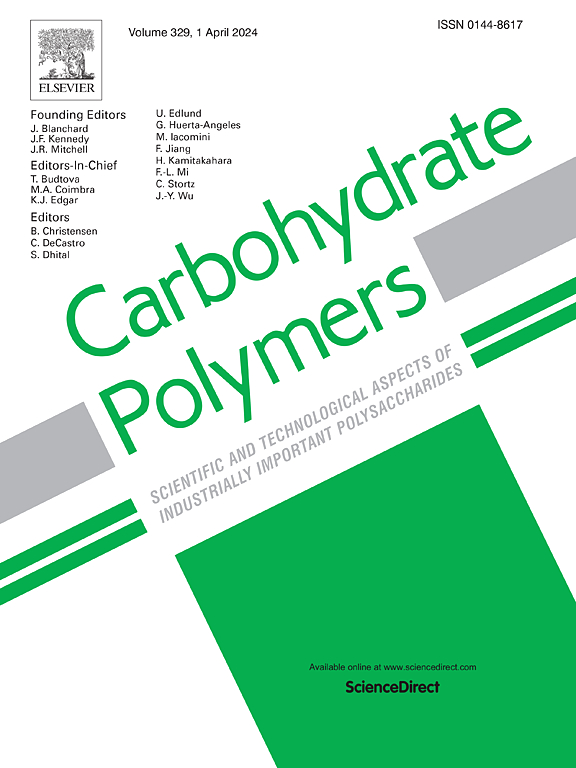Gut microbiota-mediated immunomodulation underlies the anti-tumor effects of a novel ginseng polysaccharide
IF 12.5
1区 化学
Q1 CHEMISTRY, APPLIED
引用次数: 0
Abstract
A novel ginseng polysaccharide (GP-A) was investigated for its immune modulation and anti-tumor effects in an S180 sarcoma mouse model. GP-A, with a molecular weight of 1.121 × 104 g/mol, primarily consists of a polysaccharide main chain formed by →4)-α-D-Glcp-(1 → sugar residues, along with 1,3,5-Araf and 1,5-Araf side chains. In vivo, GP-A improved immune organ recovery and serum cytokine levels, restoring immune balance by downregulating IL-10 and upregulating TNF-α and IL-6. GP-A enhanced IL-6-mediated PI3K/AKT signaling, promoting splenic immune cell proliferation and activation, thereby improving the host's anti-tumor immune response and inhibiting tumor cell proliferation. Oral administration of GP-A (100, 200, 400 mg/kg) for 10 days significantly reduced tumor size, volume, and weight, with the 400 mg/kg group achieving a 66.52 % tumor inhibition rate (96.91 % in the CTX group). Additionally, GP-A improved gut microbiota dysbiosis induced by the tumor, increasing Lactobacillus abundance while decreasing Alloprevotella and Bacteroides. It also elevated short-chain fatty acid (SCFA) levels, particularly propionate and butyrate, maintaining gut microecological balance. GP-A exhibited milder and safer immune modulation, suggesting its potential as a novel immune modulator for cancer therapy.
肠道微生物介导的免疫调节是一种新型人参多糖抗肿瘤作用的基础
研究了一种新型人参多糖(GP-A)在小鼠S180肉瘤模型中的免疫调节和抗肿瘤作用。GP-A分子量为1.121 × 104 g/mol,主要由→4)-α- d - glcp -(1→糖残基组成的多糖主链以及1,3,5- araf和1,5- araf侧链组成。在体内,GP-A通过下调IL-10和上调TNF-α和IL-6,改善免疫器官恢复和血清细胞因子水平,恢复免疫平衡。GP-A增强il -6介导的PI3K/AKT信号通路,促进脾免疫细胞增殖活化,从而提高宿主抗肿瘤免疫应答,抑制肿瘤细胞增殖。口服GP-A(100、200、400 mg/kg) 10天可显著降低肿瘤大小、体积和重量,其中400 mg/kg组肿瘤抑制率为66.52% (CTX组为96.91%)。此外,GP-A改善了肿瘤引起的肠道菌群失调,增加了乳酸菌的丰度,减少了异丙杆菌和拟杆菌。它还能提高短链脂肪酸(SCFA)水平,特别是丙酸和丁酸,维持肠道微生态平衡。GP-A表现出更温和、更安全的免疫调节作用,提示其作为一种新型的肿瘤免疫调节剂的潜力。
本文章由计算机程序翻译,如有差异,请以英文原文为准。
求助全文
约1分钟内获得全文
求助全文
来源期刊

Carbohydrate Polymers
化学-高分子科学
CiteScore
22.40
自引率
8.00%
发文量
1286
审稿时长
47 days
期刊介绍:
Carbohydrate Polymers stands as a prominent journal in the glycoscience field, dedicated to exploring and harnessing the potential of polysaccharides with applications spanning bioenergy, bioplastics, biomaterials, biorefining, chemistry, drug delivery, food, health, nanotechnology, packaging, paper, pharmaceuticals, medicine, oil recovery, textiles, tissue engineering, wood, and various aspects of glycoscience.
The journal emphasizes the central role of well-characterized carbohydrate polymers, highlighting their significance as the primary focus rather than a peripheral topic. Each paper must prominently feature at least one named carbohydrate polymer, evident in both citation and title, with a commitment to innovative research that advances scientific knowledge.
 求助内容:
求助内容: 应助结果提醒方式:
应助结果提醒方式:


